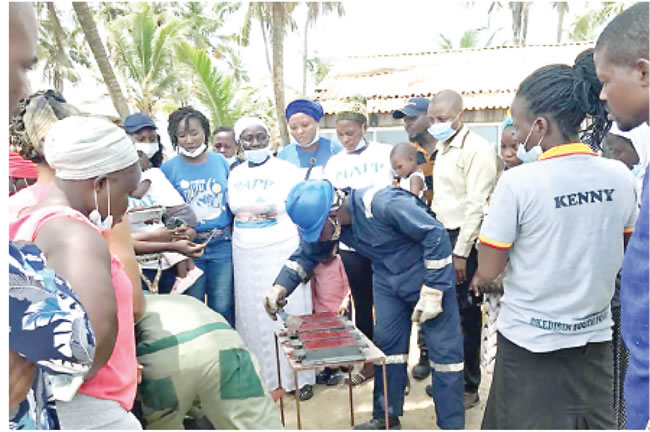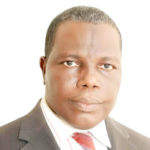PLASTIC pollution is one of the most dangerous forms of pollution affecting marine life. To curb this form of pollution and promote circular economy in Nigeria, an ACU Blue Charter Fellow at the University of Plymouth, Dr Taiwo Hammed has taught Idado, a coastal community in Lagos, how to turn plastic waste into bricks that can be used to pave roads.
Recognising the plastic pollution crisis and the threat to marine life, the Association of Commonwealth Universities (ACU) under the ACU Blue Charter Fellowships Programme, has supported outstanding talents in the field to produce research, build knowledge exchange skills, and translate their knowledge into action. Fellows’ research outcomes are aligned with the following thematic areas: Preventing plastics from getting into the sea; developing alternatives to plastics; and cleaning up the seas.
One of the research fellows, Dr Hammed conducted a hands-on training workshop on upscaling plastic waste to road pavement bricks as part of the Blue Charter Fellowship research uptake.
The community in focus for the uptake conducted in March 2021 was Idado, a coastal community in Ibeju-Lekki Local Government Area of Lagos.
Dr Hammed, a lecturer with the Department of Environmental Health Sciences, College of Medicine, University of Ibadan, said that uptake is a result of his participation in the Blue Charter Knowledge Exchange Grant Scheme.
According to him, the scheme provided grants to alumni of the Blue Charter Fellowship programme to conduct activities aimed at ensuring the uptake of their research findings by end users.
The ACU and Waitrose & Partners that sponsored the programme found his research on marine plastic pollution of great potential to create lasting change in local communities affected by plastic pollution.
Using simple tools such as drum, metal mould, hand trowel, shovel and fire wood, Dr Hammed demonstrated the process of making road pavers by mixing molten plastic with beach sand.
According to him, “the road pavers produced are very strong, durable and can withstand harsh weather condition.”
Speaking on their durability, he said that unlike interlocking tiles made of cement; these road pavers due to their polymer constituent do not soak water.
Dr Hammed told Nigerian Tribune that for more than 50 years, the global production of plastics has continued to rise and millions of tonnes of plastics end up in oceans each year.
He said that “due to the lack of community participation and involvement in Plastic Waste Management (PWM) policies and practices, Nigerian communities in the coastal area dispose of their plastic wastes in water bodies or in storm drainage channels.
“Effective methods such as recovery and recycling in marine neighbourhood communities that will prevent plastics from getting into the sea, however, remain insufficient and have not been implemented.”
The hands-on training had developing a circular economy as one of its themes, including upstream solutions to prevent plastics from becoming waste along the coastline. Participants were led on picking all the plastic waste along the coastline and segregating them into different polymers.
One of participants at the programme, Mr Ayuba Salami testified that indeed waste nylon bags and plastic bottles were a challenge to coastal communities hence his excitement at finding a way to convert these wastes into useful products.
“I picked interest in how to take out this waste because I live in a riverine community. I am grateful to be part of the exercise,” he said.
At the end of the programme, Dr Hammed said, “It is our belief that this capacity building workshop will engender maximum participation of the community in collecting, separating and putting plastic waste into circular economy in a proper way rather than putting it on water bodies.”
Having demonstrated the workability of the technology used in the uptake, it is hoped that concerned authorities would pick interest in expanding the scale and scope of the solution. This will go a long way in developing Nigeria’s circular economy and reducing the plastic pollution crisis in the country’s water bodies.
YOU SHOULD NOT MISS THESE HEADLINES FROM NIGERIAN TRIBUNE
We Have Not Had Water Supply In Months ― Abeokuta Residents
In spite of the huge investment in the water sector by the government and international organisations, water scarcity has grown to become a perennial nightmare for residents of Abeokuta, the Ogun State capital. This report x-rays the lives and experiences of residents in getting clean, potable and affordable water amidst the surge of COVID-19 cases in the state…
Selfies, video calls and Chinese documentaries: The things you’ll meet onboard Lagos-Ibadan train
The Lagos-Ibadan railway was inaugurated recently for a full paid operation by the Nigerian Railway Corporation after about a year of free test-run. Our reporter joined the train to and fro Lagos from Ibadan and tells his experience in this report… Three dies, five injured as INEC loses staff to motor accident ; Three dies, five injured as INEC loses staff to motor accident ; Three dies, five injured as INEC loses staff to motor accident.






